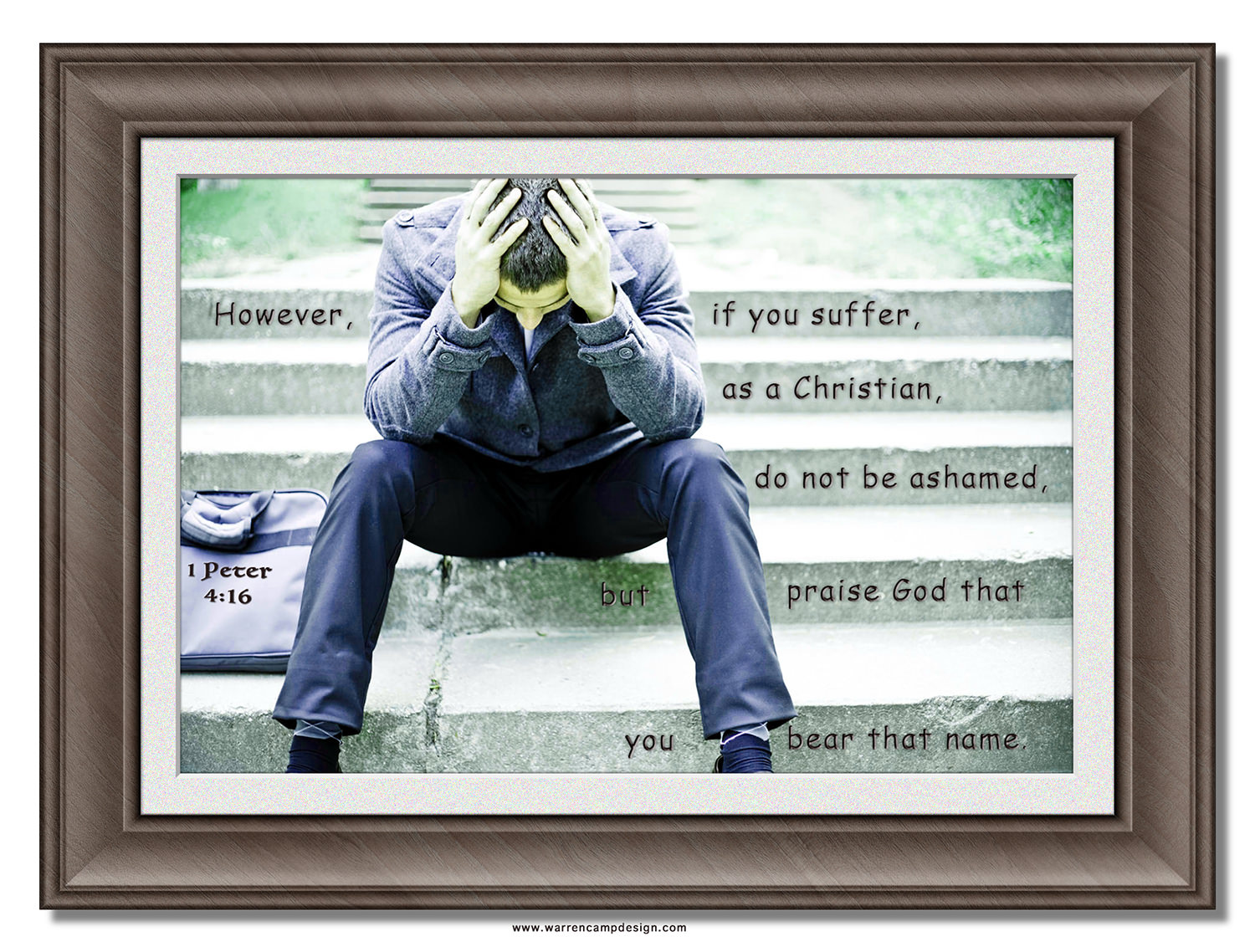
by Warren Camp
1 Peter 4:12–19 . . .
“Suffering for Doing Good, Not Evil”
After Peter reminded us in his previous passage (open Warren’s commentary on 4:1–11) that Christ had suffered for each of us so that we’d finally and fully be finished with sin, Peter further admonishes Christians to have the right attitude about our suffering.
In today’s passage, Peter will begin to highlight the third and final division of his first epistle. He’ll present the climax of his urgent warning meant to strengthen the church body so it could deal with the terrible persecution each believer was already enduring. He closes the chapter with this encouraging declaration: “those who suffer according to God’s will should commit themselves to their faithful Creator and continue to do good.”
How Best to Endure Trials (4:12–13)
Peter’s beloved v. 12 greeting is immediately followed by a comforting warning to his friends: It’s natural for the world to hate you; so don’t think that there’s anything strange or unusual happening to you. Instead, rejoice as a result of Christ’s extensive suffering.
Suffering for Being a Christian
12Dear friends, do not be surprised at the fiery ordeal that has come on you to test you, as though something strange were happening to you. 13But rejoice inasmuch as you participate in the sufferings of Christ, so that you may be overjoyed when his glory is revealed (1 Pet. 4:12–13 NIV).
When we undergo suffering, what a comfort it is to know that God loves his children with an infinite amount of love. “Instead of thinking of trials — even fiery ordeals (Greek: pyrosis) — as strange or peculiar occurrences (v. 12), we see them as ways to partake of Christ’s sufferings. And if we participate in His sufferings, we will also partake of His glory and joy. We can only “participate of the sufferings of Christ” because He partook of our humanity and sufferings. He became a man and suffered so that our suffering wouldn’t be meaningless. It’s good to share anything with Jesus, even His suffering. And, v. 13’s “inasmuch” implies a measure: Those who’ve suffered more in Jesus will rejoice more at His coming in glory.”[1]
These believers in Jesus apparently thought it inconsistent for a Christian to be afflicted by severe persecution. They didn’t fully realize that suffering is an integral part of Christianity, for it is part of God’s plan for the Christian to suffer for his and her faith. According to Peter, the mental attitude that we Christians are to display, in the midst of suffering, is to “not be surprised” or astonished by our suffering or to even think that such a calamity is somehow out of God’s control. Suffering for Christ is an inevitable part of Christian living; it’s inescapable! Without exception, all Christians must go to the school of suffering; we shouldn’t be surprised, astonished, or upset when trials, testings, and temptations come into our lives. No matter how much we suffer for Christ, we are to rejoice and keep on rejoicing (Romans 5:3; James 1:2–3).
There was nothing random or masochistic about Christ’s suffering; it had a purpose. Christ suffered for us — on our behalf — in our place. Because we were the sin committers, the suffering should have been ours to endure. But, in keeping with the sacrificial code prescribed by Torah law, Jesus became “the Lamb who was slain” (Revelation 5:12), “the Lamb of God, who takes away the sin of the world!” (John 1:29), “Christ, our Passover lamb,…sacrificed in our place” (1 Corinthians 5:7), the “you were redeemed…with the precious blood of Christ, a lamb without blemish or defect” (1 Pet. 1:18–19).
If You Suffer for Being a Christian (vv. 14–16)
Regarding Christians being “insulted because of the name of Christ,” Peter begins v. 14 by reiterating the principle that Jesus stated in the Sermon on the Mount: “Blessed are you when people insult you, persecute you and falsely say all kinds of evil against you because of me. Rejoice and be glad, because great is your reward in heaven, for in the same way they persecuted the prophets who were before you” (Matthew 5:11–12).
14If you are insulted because of the name of Christ, you are blessed, for the Spirit of glory and of God rests on you. 15If you suffer, it should not be as a murderer or thief or any other kind of criminal, or even as a meddler. 16However, if you suffer as a Christian, do not be ashamed, but praise God that you bear that name (1 Pet. 4:14–16).
Christ was reviled on the cross; all his followers, including us, can expect to suffer insults as well. When that happens, we shouldn’t feel ashamed. Instead we’re to praise God for being his child because “the Spirit of glory and of God rests on [us]” (v. 14). The word “rests” is in the present tense, meaning, these Christians were already possessing the Holy Spirit of God, which was already resting on them and now rests on us, providing us all with needed strength and guidance.
Peter offers v. 15 as clarification: The blessings that Christ has promised to suffering Christians don’t apply when they’re murderers, thieves, evil doers, or meddlers in other people’s affairs. Such sinners will suffer justly; they can’t expect a blessing or reward due to their hardships. Verse 16 starts with an attention-getting “However” (or “But” or “Yet,” depending on version). Christians who suffer because of their faith have no reason to be ashamed. Christians should “praise God that we bear that name.” We should wear Christ’s name proudly, acting and speaking in ways that give God the glory he deserves.
Christ suffered for our sins, once, for all, which is precisely why Peter instructs us that our suffering for Christ’s sake must not be a result of our sin. When Christ suffered on the cross, he suffered for us so he could fully bear our sins. So, when we take up our cross and suffer for his sake, we do it for the sake of righteousness. Christ’ most-painful work on Calvary’s cross is complete, until he returns in glory. Sadly, man continues to reject him (see 1 Peter 2:6–8). When we personally identify with Christ and live in his righteousness, people reject and persecute him by rejecting and persecuting us. There’s never any pleasure in suffering. But in light of Peter’s teaching, suffering is a privilege and a cause for rejoicing. We should loom for and see the delightful outcome of the process that God’s bringing about through the pain of suffering and persecution.
Judgment that Can Purify One’s Faith (vv. 17–18)
God does, in fact, judge his children on this side of eternity. While that’s a challenging concept for some of us, it’s what Peter is saying here. Please realize this carefully: God’s “Time for judgment to begin” has nothing to do with determining punishment for our sins; neither is this the time to judge if we’re worthy of heaven.
17For it is time for judgment to begin with God’s household; and if it begins with us, what will the outcome be for those who do not obey the gospel of God? 18And, “If it is hard for the righteous to be saved, what will become of the ungodly and the sinner?” (1 Pet. 4:17–18)
“The judgment Peter refers to here is purify our faith (1:6–7). It’s meant to draw us to trust God more deeply, to abandon our hope of finding satisfaction in anything apart from Him. It’s our faith, our trust in Him, that our Father values in us, so much so that He’s willing to allow us to experience great suffering to help us grow fully dependent on Him. Peter further makes a sobering point regarding God’s judgment. God is willing to allow His dearly loved children to suffer under his judgment, in order to purify and rescue them. Consider then, that those who fully reject faith in Christ, declining the gospel (v. 17), will experience far, far worse.
“At the close of v. 18, Peter quotes Proverb 11:31 to support his point made in the previous verse. God judges His children during our life on earth, to strengthen and purify our faith. Those who reject Christ can expect much worse. Again, we need to be careful not to insert meaning into this passage. Peter is not saying that Christians are those who try really hard to be saved and then just barely make it into heaven by their best efforts (3:18). Peter is saying that eternal salvation through faith in Christ comes with difficulty in this life on earth. Our loving Father treats us as children who need discipline to learn to trust Him, to learn to walk in His way.”[2]
Suffering Saints Are to Act Appropriately (v. 19)
Having instructed his readers about their attitude toward suffering, Peter now moves on to the actions appropriate to these attitudes.
19So then, those who suffer according to God’s will should commit themselves to their faithful Creator and continue to do good (1 Pet. 4:19).
True believers must be focused on continuing to do the good will of God by living in righteousness. If that’s this difficult for you, just imagine what will happen to those who persecute us and refuse to accept the gospel of of who Jesus is. May God have mercy on them. And may He use each of us to continue to present the gospel to them while they’re still able to hear our testimony.
Suffering “according to God’s will” requires faith. We’re to entrust our souls to God as Jesus had done. He entrusted his soul (or spirit) to Father God: “When they hurled their insults at him, he did not retaliate; when he suffered, he made no threats. Instead, he entrusted himself to him who judges justly” (2:23). We’re to entrust our souls to our “faithful Creator” because the things we hope for don’t yet exist. Those things for which we hope are the very things that God himself must create. We must worship God, our faithful Creator. And we must “continue to do good.”
When we know that doing good will provoke the wicked to persecute us, doing what is right becomes a testimony to our confidence in our “faithful Creator.” Persecution and suffering are a part of God’s divine plan for his saints, as well as for lost sinners.
Concluding Considerations from Dr. Charles Stanley
In today’s passage, Peter refers to times of testing as “fiery ordeals.” He says we shouldn’t be surprised when adversity comes our way. It’s important to remember that God has a purpose for our trials and will see us through each step of the way. Trials are unavoidable in life. Our heavenly Father will sometimes use painful experiences to cleanse and purify His children’s lives. Trials drive us toward the Lord. As we begin to focus on Him, we become increasingly able to see things from His perspective and often become more aware of our sin.
Also, the Lord at times allows difficulty in our lives as a way of testing our faith, endurance, or devotion to Him. God also uses suffering to demonstrate His power to sustain us. When He brings us through difficult times, He glorifies Himself. In turn, this encourages others when they experience trials, because they’ve witnessed God’s sustaining power in our lives. Ultimately, hardships strengthen our testimony. When the storm has passed, we can often look back and see the Lord’s providential hand that carried us through. There are several things for the Christian to do when confronted with conflict.
First, we should trust God, based on His holy Word. Scripture assures us that the Lord knows our limits and will therefore never allow us to be pushed or tempted beyond our ability to persevere (1 Cor. 10:13). Second, We must trust in His faithfulness. Third, we must make a conscious decision to persevere; perseverance in the face of trials leads to the hope which “does not disappoint” (Rom. 5:5). Finally, it’s important to acknowledge the sovereignty of almighty God. Our heavenly Father is never surprised by the tragedies in our lives. Rather, he stands ready to work in us (Philippians 2:13), through us (1 John 4:4), and for us (Rom. 8:31) to bring us to the point of victory in His Son, Jesus Christ.
- Q. 1 What’s your usual response when you face times of trouble?
- Q. 2 What purpose does God have for the hardships you face?

‘The Last Supper’
Click to open “Peter Masterpieces.”
Summary Video: “First Peter”
† Watch this overview video of First Peter created by BibleProject.
Warren’s New “Peter Masterpieces” Photo Album
† View several classic paintings of Saint Peter by art world masters: Rembrandt, Michelangelo, Da Vinci, Rubens, Goya, El Greco, Raphael, Masaccio, Giotto, Correggio, Tintoretto, Caravaggio, Veneziano, and many more.
1 Peter 4:12–19
New International Version (NIV) or view it in a different version by clicking here.
— Listen to chapter 4, narrated by Max McLean.


